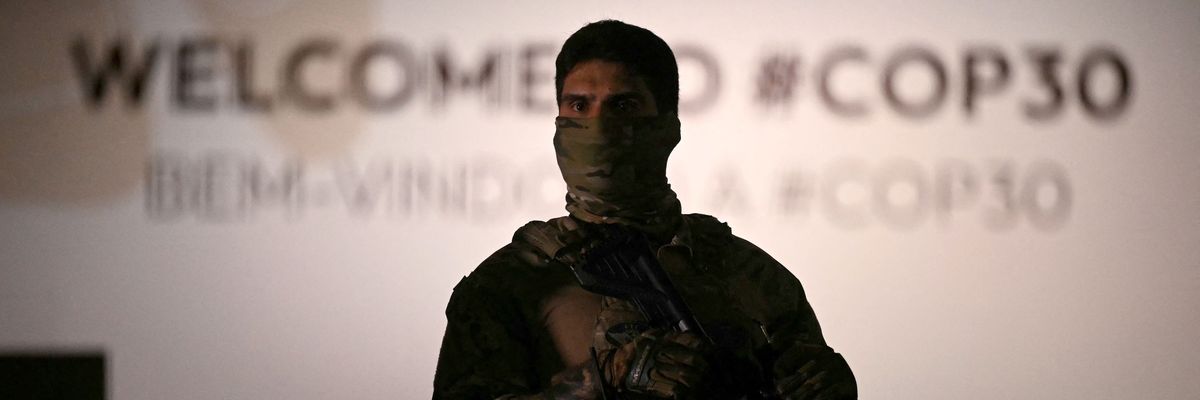Blatant lies are putting the people and our planet at risk. Often told for profit or power’s sake, they hurt economic, environmental, and social standing of most of us at the expense of a few. In this nasty game, those who strive to expose the truth and stand up for progress pay the steepest price. And they are environmental activists, journalists, scientists, and ordinary citizens defending their communities.
This month, two pivotal global summits happen that could bring change. In Bangkok, Thailand, the International Civil Society Week brought together over a thousand citizen activists from around the world. In Belem, Brazil, COP30—the global climate conference—will see governments, businesses, scientists, and many others negotiate. Citizen activists and civil society may finally have a say there. The last three climate summits held in countries where there’s little democratic freedom and heavy reliance on oil production shunned them.
To fight the lies that stall progress, Brazil has launched a Global Initiative for Information Integrity on Climate Change at the climate summit. The civil society week declaration calls strongly for both climate action and ending disinformation. Global civil society leaders like Oxfam, ActionAid, and Greenpeace as well as hundreds of grassroots organizations from Afghanistan to Zambia have endorsed.
However, buzzwords like disinformation and lack of information integrity, in their sophistication, often dull the impact. Perhaps they feel inauthentic. We need to think outside the box to engage in more authentic conversations involving people with diverse viewpoints.
For starters, let’s call false information what they are, lies. Lies that pervert the progress, hurt the many, and kill those who speak up. This game of lies started decades ago with big oil and gas corporations, long before “fake news,” disinformation and misinformation were a thing. What has gotten worse is that they are now blatantly colluding with governments and political leaders around the world to protect their short-term gain.
Those who stand to lose the most in the game are ordinary folks, especially those who struggle to make a daily living or don’t have the resources to defend themselves.
Let’s be clear: this isn’t only about “social justice.” The climate lies stall economic growth. The United Sates, once the global champion of the free market, is today doomed to become uncompetitive. President Trump, sponsored by American oil oligarchs blatantly lied at the United Nations earlier this year. His claims that renewable energy is dangerous, expensive, and unreliable will hurt the economic progress of the United States and the world.
He attacked countries making progress on renewable energy. The narrative of lies leads to decisions and bullying of nations and communities. When Trump raised tariffs against solar panels made in Southeast Asia, workers lost jobs. This includes Thailand, where civil society week was held.
Examples are many from Trump and other regimes. Russian bots, European and Australian leaders, too, have spread lies about the unreliability of renewable energy, including false threats of job loss and a rise in commodity prices. China, despite being the global leader in renewable energy, attacks environmental activists.
The lies kill. In the past decade, over 2,000 activists have paid with their lives for speaking up and standing up to protect forests, rivers, and community resources. They stood up against coal and oil extraction, mining, logging, land grabbing, and large-scale development that destroyed communities.
Civil society and activists who speak up get labelled foreign agents or eco-terrorists. They are arrested, harassed in public and in courts, and bullied online. This is despite their efforts to try to protect us. Every year, climate disasters, worsened by fossil fuels and harmful developments, kill tens of thousands and displace millions. The lies kill both blatantly and silently.
For the lies and bullying to end, we must engage in an open, honest, and empathic conversation. We need to have dialogue with diverse viewpoints. And this is not easy because all of us are burdened with our daily struggles and comfortable with information consumption habits. Hearing difficult truths and contradicting points of view are stressful.
Civil society, movements, development organizations, and media are losing relevance and trust among the general public. We have failed at listening, speaking, and interacting with farmers, women workers, students, young men, doctors, and business folks. Yes, we do speak up, but well-intentioned campaigns often end up merely preaching to the choir.
We get likes on social media, signatures for petitions, and like-minded folks at street protests. But that isn’t enough to build empathy and build a majority movement, even with those who are most likely to suffer from climate lies and bullying. To connect with people and come together with people, we must first care about who they are. As agents of social change, it is not just about playing to an audience but taking care as an ethical duty.
At the same time, we must shout out at the big fat liars, Big Oil, and their colluding partners in media and politics. Citizens, journalists, movements, and governments must stand for science, reason, and progress. This means urgently demanding an end to fossil fuels and moving to green energy while also protecting communities at risk during the transition. We must also defend the activists who stand up for our rights and the planet.
More of us must act today and stand with those who do. The argument for collective demand and action for climate progress isn’t just moral. Let’s call it collectively selfish–it may just improve our health and economic and social well-being.




